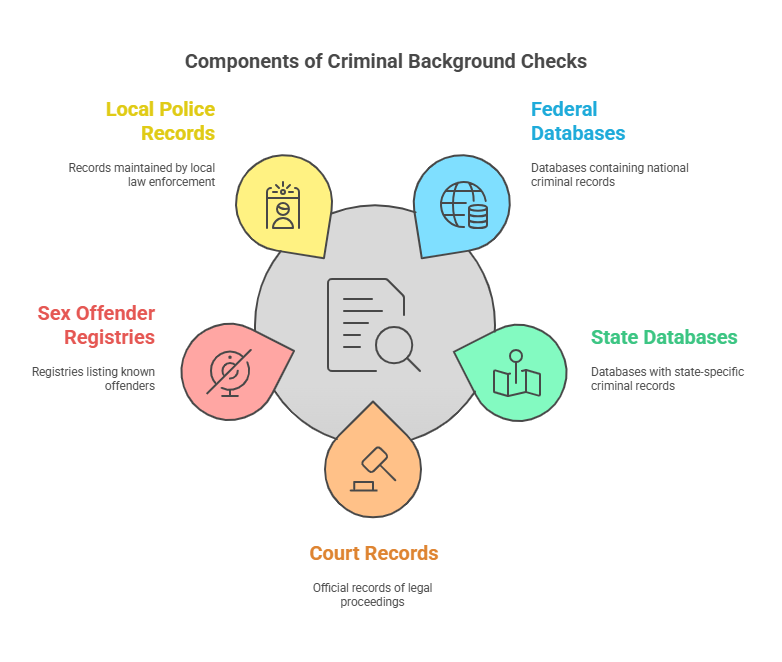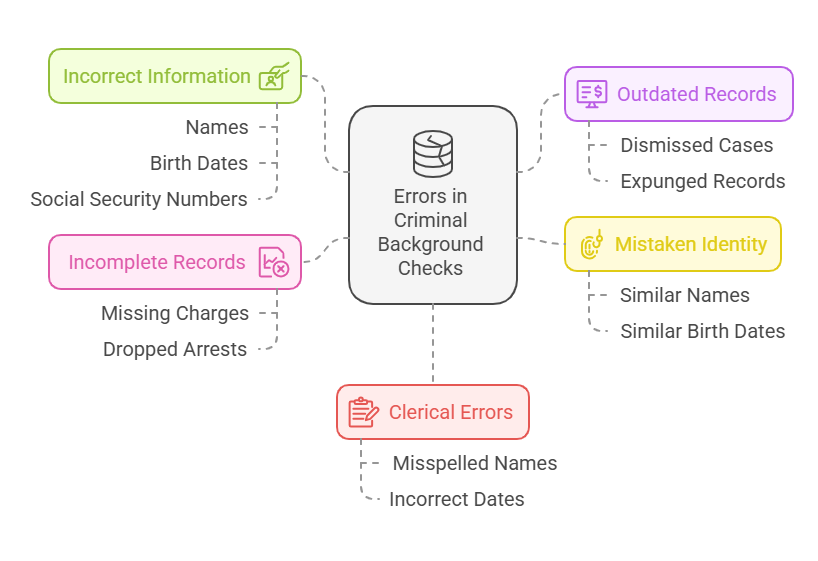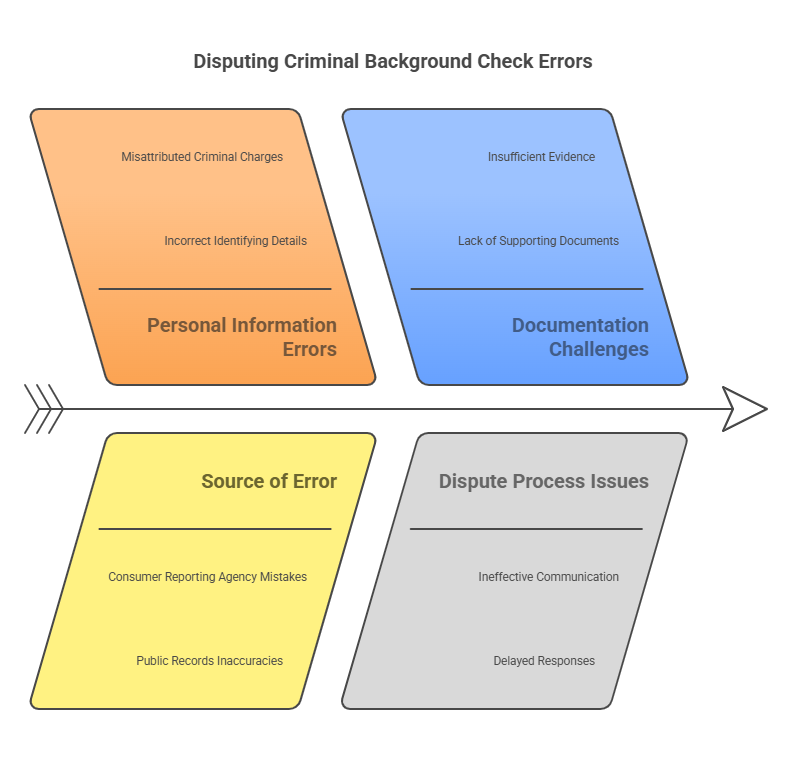What are the Steps to Dispute a Criminal Background Check

How to Dispute Criminal Background Check Information: A Complete Guide
Criminal background checks are a standard part of many employment, housing, and financial application processes. While they play a crucial role in ensuring safety and security, inaccurate or incomplete criminal background check information can have serious consequences for individuals. If you find yourself facing incorrect criminal records on a background check, it’s important to know how to dispute the information and protect your rights.
This comprehensive guide covers the entire process of disputing criminal background check information, from understanding common errors in criminal background reports to the steps you need to take to correct the information. We will also explore legal considerations and answer frequently asked questions to help you navigate the dispute process effectively.
What Are Criminal Background Checks and Common Errors Found in Reports?

Understanding Criminal Background Checks
A criminal background check is a process used to gather information about an individual’s criminal history. These checks are commonly required for job applications, housing leases, loan applications, and even volunteer opportunities. They help employers, landlords, and other entities assess potential risks associated with an individual’s criminal history.
Criminal background checks typically involve searching various databases, such as:
- Federal and state criminal record databases
- Court records
- Sex offender registries
- Local police records
These checks can reveal arrests, convictions, sentences, and other relevant details. They are performed by Consumer Reporting Agencies (CRAs), which compile information from courts, law enforcement, and other sources.
How Criminal Background Check Reports Are Generated
CRAs gather criminal history information from different sources such as public records, law enforcement databases, and court systems. They often access federal, state, and county databases to compile comprehensive background reports. The information is then compiled into a report that is shared with employers, housing authorities, and other authorized entities.
Accuracy in these reports is crucial because errors in criminal background checks can have far-reaching consequences for individuals, including the denial of employment, housing, or financial opportunities. For this reason, understanding the process behind background checks and knowing how errors can occur is vital.
Common Errors in Criminal Background Checks

Several errors can occur during the compilation of a criminal background check, including:
- Incorrect Information: Personal details such as names, birth dates, or Social Security numbers may be mixed up, leading to inaccurate background check results.
- Outdated Records: In some cases, old criminal records may appear on a background check even if the individual’s case was dismissed or expunged. These outdated records can incorrectly suggest that someone has a criminal history.
- Mistaken Identity: If someone has a similar name or birth date, it’s possible for their criminal record to be mistakenly attributed to you.
- Incomplete Records: Missing or incomplete information can also lead to discrepancies, such as missing charges or arrests that were later dropped or expunged.
- Clerical Errors: Simple clerical errors, such as misspelled names or incorrect dates, can significantly affect the accuracy of a background check.
The Impact of Inaccurate Criminal Background Information
Inaccurate criminal background check information can have serious consequences:
- Employment Denial: Employers may reject candidates based on inaccurate criminal history reports, even if the information doesn’t pertain to the individual.
- Housing Issues: Landlords may deny rental applications based on incorrect criminal background data, making it difficult for individuals to find housing.
- Legal Problems: If incorrect information is used in legal proceedings, it could lead to a loss of rights, such as firearm ownership or the ability to work in certain fields.
Given these potential consequences, it is essential to dispute any errors on your criminal background report as soon as they are identified.
Step-by-Step Guide: How to Dispute Criminal Background Check Information

Step 1: Reviewing the Background Check Report
The first step in disputing inaccurate criminal background check information is to carefully review the report. When you receive a background check report, look for the following details:
- Personal Information: Ensure that your name, birth date, and other identifying information are correct.
- Criminal Charges: Verify that the criminal charges listed are accurate and that they belong to you. If there are charges listed that you don’t recognize, they may belong to someone else.
- Convictions and Dispositions: Check whether any convictions or other legal dispositions (e.g., charges dismissed, expunged) are reported incorrectly.
- Court Dates: Ensure that the dates of any incidents listed align with your records.
If you find any discrepancies, make a note of them and proceed to the next steps.
Step 2: Identifying the Source of the Error
Next, determine where the error originated. There are several possibilities:
- Consumer Reporting Agency (CRA): The CRA that generated your background check might have included outdated or inaccurate data.
- Public Records: The mistake could stem from a public record source, such as a court or law enforcement agency, that reported incorrect information.
- Clerical Mistakes: Sometimes, human error during data entry or reporting can lead to inaccuracies.
To identify the source of the error, you may need to contact the relevant agencies or institutions that provided the information.
Step 3: Gathering Supporting Documentation
Once you’ve identified the error and the source, gather all the documentation necessary to support your dispute. This may include:
- Court Documents: If the charge was dismissed or expunged, provide the relevant court order or legal document.
- Identification: Make sure your personal identification matches the information on your report.
- Witness Statements: If necessary, provide any relevant witness statements or other supporting documents that clarify the mistake.
Having all your evidence in order will strengthen your case when filing your dispute.
Step 4: Disputing the Error with the Reporting Agency
Disputing an error with the agency that generated your criminal background check is the next step. Most CRAs allow disputes to be filed online, by mail, or over the phone. To dispute the error, follow these steps:
- Contact the CRA: Reach out to the CRA that issued the background report. This can often be done via an online dispute portal on their website.
- Submit Documentation: Provide the CRA with the necessary documentation that supports your claim that the information is incorrect.
- Provide Your Identification: Ensure that your personal details are clear and correctly match the information in the report.
- Request Correction: Ask the CRA to correct the error in your criminal background check and issue an updated report.
Step 5: Filing a Dispute with the Consumer Reporting Agency (CRA)
If the error persists after contacting the agency directly, file a formal dispute with the CRA. Here’s how you can proceed:
- Online: Many CRAs offer an online dispute resolution system where you can upload supporting documents and track the status of your dispute.
- Mail: Alternatively, you can send a written dispute to the CRA, along with the necessary supporting documentation. Ensure you send it via certified mail for proof of receipt.
- Phone: Some agencies also allow phone disputes, but these are often less reliable than written forms.
After submitting your dispute, the CRA is required to investigate the claim and respond within 30 days, providing you with the results of the dispute and a corrected background report if necessary.
Step 6: Following Up on Your Dispute
Once you’ve filed your dispute, follow up regularly to ensure the issue is resolved. If the CRA or reporting agency does not respond in the required time frame or if the dispute is not resolved in your favor, take the following steps:
- Request Updates: Follow up with the agency to ensure that your dispute is being processed.
- Escalate the Issue: If your dispute remains unresolved, consider escalating the matter to a supervisor or filing a complaint with the Consumer Financial Protection Bureau (CFPB).
ExactBackgroundChecks.com offers a transparent and compliant background check service that can help individuals verify and dispute incorrect criminal background information. They assist in ensuring your background check is accurate and can help guide you through the dispute process quickly and effectively.
Legal Aspects of Disputing Criminal Background Check Information
FCRA Compliance and Your Rights
The Fair Credit Reporting Act (FCRA) governs the process of criminal background checks and disputes. Under the FCRA, you have the right to dispute any inaccurate information on your criminal background check and request a correction.
Key points of the FCRA include:
- 30-Day Resolution: The CRA is required to investigate the dispute within 30 days.
- Corrected Report: If the dispute is successful, you are entitled to receive a corrected report.
- Notification of Employers: If your background check is used in an employment decision, the employer must notify you if they relied on incorrect information.
What Employers Can and Cannot Do with Disputed Information
Employers must follow strict guidelines when using criminal background check information during the hiring process. If a dispute is filed, the employer cannot take adverse action (e.g., denial of employment) based on inaccurate information until the dispute is resolved.
The Role of the Consumer Financial Protection Bureau (CFPB)
If you feel your dispute hasn’t been handled fairly, you can file a complaint with the CFPB. The CFPB can help ensure that your dispute is properly investigated and resolved according to the FCRA.
Frequently Asked Questions (FAQs)
Can an Employer Require Both a Drug Screening Test and a Background Check?
Yes, employers can require both a drug screening test and a background check as part of their hiring process, provided they comply with legal requirements. Many industries, such as healthcare, transportation, and finance, mandate both types of screenings to ensure workplace safety and regulatory compliance.
What Happens If I Refuse a Drug Screening Test During the Hiring Process?
If you refuse a drug screening test, the employer is within their rights to disqualify you from the hiring process. Refusal may also raise red flags about your suitability for the role, especially in safety-sensitive industries.
Are There Any Jobs That Legally Require Background Checks or Drug Tests?
Yes, some jobs are legally required to include background checks or drug tests. For example:
- Commercial drivers must undergo drug and alcohol testing under Department of Transportation (DOT) regulations.
- Jobs in education often require criminal background checks to ensure the safety of students.
- Federal jobs and positions requiring security clearances mandate thorough background screenings.
Can an Employer Refuse to Hire Me Based on the Results of a Background Check?
Yes, employers can refuse to hire you if the background check reveals information that is relevant to the role, such as a criminal record, falsified credentials, or poor financial history for jobs involving financial responsibilities. However, employers must follow the FCRA’s adverse action process before making a final decision.
How Can I Dispute Inaccurate Results in a Background Check?
To dispute inaccurate results:
- Obtain a copy of the background check report from the employer or screening agency.
- Identify any inaccuracies and gather evidence to support your claim.
- Submit a formal dispute to the screening agency, which is required to investigate and correct any errors within 30 days.
Can an Employer Require Both a Drug Screening Test and a Background Check?
Yes, employers can require both a drug screening test and a background check as part of their hiring process, provided they comply with legal requirements. Many industries, such as healthcare, transportation, and finance, mandate both types of screenings to ensure workplace safety and regulatory compliance.
What Happens If I Refuse a Drug Screening Test During the Hiring Process?
If you refuse a drug screening test, the employer is within their rights to disqualify you from the hiring process. Refusal may also raise red flags about your suitability for the role, especially in safety-sensitive industries.
Are There Any Jobs That Legally Require Background Checks or Drug Tests?
Yes, some jobs are legally required to include background checks or drug tests. For example:
- Commercial drivers must undergo drug and alcohol testing under Department of Transportation (DOT) regulations.
- Jobs in education often require criminal background checks to ensure the safety of students.
- Federal jobs and positions requiring security clearances mandate thorough background screenings.
Can an Employer Refuse to Hire Me Based on the Results of a Background Check?
Yes, employers can refuse to hire you if the background check reveals information that is relevant to the role, such as a criminal record, falsified credentials, or poor financial history for jobs involving financial responsibilities. However, employers must follow the FCRA’s adverse action process before making a final decision.
How Can I Dispute Inaccurate Results in a Background Check?
To dispute inaccurate results:
- Obtain a copy of the background check report from the employer or screening agency.
- Identify any inaccuracies and gather evidence to support your claim.
- Submit a formal dispute to the screening agency, which is required to investigate and correct any errors within 30 days.
Conclusion
Disputing inaccurate criminal background check information is a crucial step in protecting your rights and ensuring your personal information is correct. By following the steps outlined in this guide and utilizing services like ExactBackgroundChecks.com, you can resolve disputes quickly and efficiently. Stay proactive, be informed, and always ensure that your background information reflects your true criminal history.




I want to dispute pending charges I have on my background check because I have not been convicted and is affecting my employment candida cy
This is an incredibly detailed and helpful guide on disputing criminal background check information! Errors in background checks can have serious consequences, so it’s crucial to know how to address them effectively. The step-by-step process, from reviewing the report to filing a dispute with the CRA, is well-explained and actionable. Understanding your rights under the FCRA and knowing when to escalate issues to the CFPB is also invaluable. Thanks for sharing such a comprehensive resource—it’s a must-read for anyone dealing with inaccurate background checks!